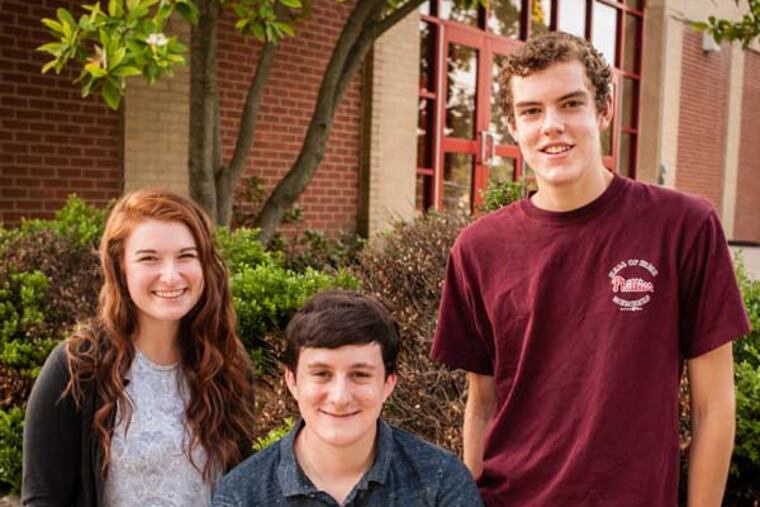'Redskin' controversy continues for Neshaminy editors
The student editors overseeing Neshaminy High School's newspaper have routine summer plans. Gillian McGoldrick will work at Rita's Water Ice. Reed Hennessy wants to volunteer at the National Constitution Center. Jackson Haines is looking for a job to fill idle hours.

The student editors overseeing Neshaminy High School's newspaper have routine summer plans.
Gillian McGoldrick will work at Rita's Water Ice. Reed Hennessy wants to volunteer at the National Constitution Center. Jackson Haines is looking for a job to fill idle hours.
"Teenager stuff," Haines, 17, said with a smile last week.
Unlike the last eight months.
Since October, the editors of the Playwickian have been battling with administrators about whether they can ban the word Redskin, the school mascot, from the paper. Even as the school year came to an end last week, the controversy coursed through the halls.
A board member said students may have violated district policy - or even the law - by printing an issue without approval. Editors saw the principal confiscating copies in the halls. And board meetings have been scheduled for the end of this month, potentially to vote on the issue. That might trigger a lawsuit from the student editors, all scheduled to return as seniors this fall.
Previous Neshaminy editors have banned Redskin from the paper with far less drama, and questions about the word have bubbled for years with other schools and teams.
Last week, controversy again enveloped the NFL's Washington Redskins, after the U.S. Patent and Trademark Office stripped the team of its trademarks, ruling they were disparaging to Native Americans.
But the circumstances at the Playwickian this year have been filled with twists and turns, Neshaminy community members say, polarizing the school and thrusting the teen editors into the national spotlight. As its football team romped toward the state playoffs last fall, peers even threatened to burn the paper, the editors said.
"It just seems almost surreal," Haines said Tuesday outside the high school.
The saga began in October, when members of the Playwickian's editorial board voted 14-7 that Redskin was a racial slur and they would not print it.
A month later, principal Rob McGee ordered the ban overturned, saying the editors might violate the First Amendment rights of others by removing the word from their copy. The students subsequently said they would not adhere to McGee's directive - and a law firm jumped into the fray to represent them.
All the while, national media outlets like ESPN and NPR took notice, and the Washington Redskins' name was under fire from critics including President Obama, adding fuel to the fight in Neshaminy.
Similar battles have occurred elsewhere. In 2001, the U.S. Commission on Civil Rights encouraged schools to stop using a Redskin mascot. Parsippany High School, in New Jersey, responded by renaming its teams the Red Hawks.
Eugene Vasile, Parsippany's superintendent at the time, said last week that the decision "led to a rather contentious time for me and, frankly, for the community."
There were protests and letters to the editor, Vasile said in a phone interview from North Carolina, where he retired in 2006. Students even engineered a walkout one day, he said, and media attention magnified the situation. "There was a lot of negative reaction to it," he said.
Sparks also flew last year in Washington state, when the Port Townsend school board ordered its Redskin mascot to be replaced by May 2014. Athletic director Scott Wilson said in an interview last week that he received angry letters, e-mails, and phone calls, and that social media were abuzz with dissenters. "They were proud of their Indian chief, and it's something they didn't want to let go of," Wilson said.
Port Townsend High School renamed their teams the Redhawks.
The editors at Neshaminy say they've experienced similar blowback, even though their intent was to ban the word from the newspaper, not change the mascot.
Steve Pirritano, a member of the Neshaminy school board, is among those who feels the students have gone too far. The students have rejected any compromise on printing the word, he said, and they printed the paper in June without permission, which likely violated district policy.
The district is investigating that incident, Pirritano said, and because it may have cost thousands of dollars to print, he said, it's possible administrators will refer the case to police. "In the end, it wasn't about their editorial rights," Pirritano said. "It was about, in my opinion, their ability to invoke their social opinion on the rest of the paper."
Two board meetings this week could determine if students are allowed to ban the word. The students said they may sue if the board prohibits them from setting their own editorial guidelines. They're already on edge, after school officials last week reset the passwords for the newspaper's e-mail and social-media accounts, effectively locking them out.
Vasile and Wilson said that they applaud the students for fighting against what they deem a racist term, and that in each of their districts, community members eventually settled down and embraced their new identities. McGoldrick, the Playwickian's editor-in-chief, said the editors would battle as long as they could. "If it's necessary for a fight," she said, "we're going to be ready for it."
609-217-8305 @cs_palmer